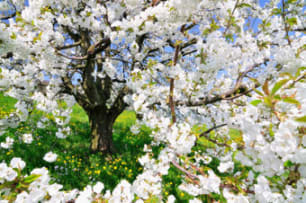
“Hai man denafik beyomei Nissan vechazi elanei d’ka milbalvi omer…”
(Tractate Brachot 43b)
If one goes outside during the month of Nissan and sees trees that are blossoming he recites a blessing (Birkat Ha’Ilanot).
The bracha is noted in the tractate Brachot and the Code of Jewish Law (O.C. 226).
Baruch atah Adonay Elohaynu melech haolam shelo chasar b’olamo klum u’bara bo b’riyot tovot v’elanot tovim l’hanot bahem b’nay adam.
The G’ra in his siddur substitutes the word davar instead of klum.
This blessing is said on fruit bearing trees (M.B. 226:22). Regarding a fruit tree that has the status of “orlah” – a tree less than three years old – it is the view of Rabbi Akiva Eiger, in his commentary on Code of Jewish Law O.C. 226, that one does not say a blessing.
It is preferable to say birkat ha’ilanot as soon as one sees a fruit tree in bloom, which is usually during the month of Nissan. However the Aruch Hashulchan (226:1) notes that in some countries trees begin to bloom in Iyar or Sivan and as such those months would then be the proper time to recite the blessing. The Har Tzvi (O.C. #118) says that if you are in a country where trees bloom earlier than Nissan the blessing can be said earlier.
Ideally, Birkat Ha’Ilanot should be said on a weekday and not on Shabbat (Kaf Hachayim 226:4), as some authorities are anxious that one may come to shake the tree or break off a branch on Shabbat which is prohibited.
If a tree blossomed in Nissan but one did not see it until later he may say the bracha as long as the fruit on the tree has not yet ripened (Mishna Berurah 226:4). However, one who saw a fruit tree in bloom during the month of Nissan but forgot or neglected to recite a blessing, may only recite the bracha up until the fruit has begun to grow (Mishna Berurah 226:5).
Though the blessing is said during a specific period of time during the year it is not considered a time restricted mitzvah (Har Tzvi O.C. #118) and as such women are encouraged to take part in this bracha of appreciation.
The sefer Kaf Hachayim (226: 7-8) describes a custom among the Sephardim to say this bracha with a minyan followed by kaddish in addition to several other rituals.
There is a rabbinical debate as to whether one can say this blessing on a tree that has been grafted from two species (Kaf HaChayim 225:26, 226:11).
With this bracha we praise G-d’s ongoing renewal of creation during the season of redemption in which we renew our commitment to serving Him.



